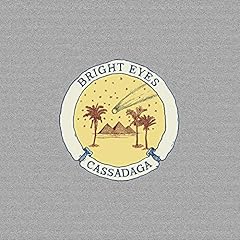
Artist-Bright Eyes
Album-Cassadaga
Release Date-Apr 10, 2007
Genre/Style-Indie Rock/Indie Pop
Size-85M
Quality-192kbps
Official Site-http://www.thisisbrighteyes.com/
and http://www.myspace.com/brighteyes
Biography-http://en.wikipedia.org/wiki/Bright_Eyes
Youtube online videos-http://www.youtube.com/watch?v=PrBZuCSr7dI

Review-Call him pretentious, call him sensitive, call him what you will, but there's no denying the fact that Conor Oberst is a talented and intelligent songwriter. Actually, it's probably more correct to say that Bright Eyes are a group of talented and intelligent songwriters, because it's the pedal steel, the clamorous percussion, the orchestral arrangements, the thick background vocals that add to the songs in Cassadaga — the band's fullest and most developed record to date — almost as much as the lead singer's own wobbly voice and sharp lyrics. Because the album is, like all of Bright Eyes' albums, very much about the words. Besides the usual swatch of Middle America character sketches and the occasional political allusions, Oberst writes dialogue that travels throughout the record, questioning religion and truth and love and purpose the entire time. He knows he has to go somewhere, and he's hoping that if he just keeps moving, where exactly that is will make itself clear. "Cassadaga might be just a premonition of a place you're going to visit," a psychic says to him in the opener, "Clairaudients (Kill or Be Killed)," which acts an introduction to both the album's musical (slightly spacey, organic acoustic melodies) and lyrical (direction, control) themes. Oberst sees himself in a place where "everything must belong somewhere" and "death may come invisible," a place where mystics and clairvoyants can tell us as much about our own selves as we can, a place where destiny exists, a place where God is both an omnipotent "Brakeman" and a myth construed in books. Perhaps because of this, Oberst appears more unsure than he ever has. But also because of this, this lack of control, it's not an insecurity about himself that he feels, but rather a kind of shadowy acceptance of the uncertainty of life. "The 'I don't know,' the 'maybe so'/Is the only real reply," which he sings on the stormy Western dirge "Middleman," his voice accepting and empty at the same time, is the most truthful assurance he can offer. Because, despite the gravity of the ideas presented on Cassadaga, it's not a depressing or even overly serious album. Rather, it's finding what you can, be it a geographic location or a mind state, when and how you can, amid the incomprehensible world around you; it's Americana, full of folky acoustic guitars and dobro and dissent and yet, still, a kind of hopeful optimism that can't hide itself completely under the strings, clarinets, and cynical irony; it's a mature interpretation of life, not just whining complaints. "I'm leaving this place but there's nothing I'm planning to take/Just you," Oberst confesses on "No One Would Riot for Less." Where he's going — Manhattan, California, the Hague, New England, or even Cassadaga itself — he doesn't know, but he's going to keep looking until he finds it, and he's got his guitar, his simple chords, his verses and choruses, to help him (and perhaps us) along.
Product-buy it here
Download Links have been removed. Please go to music store to purchase it.





No comments:
Post a Comment